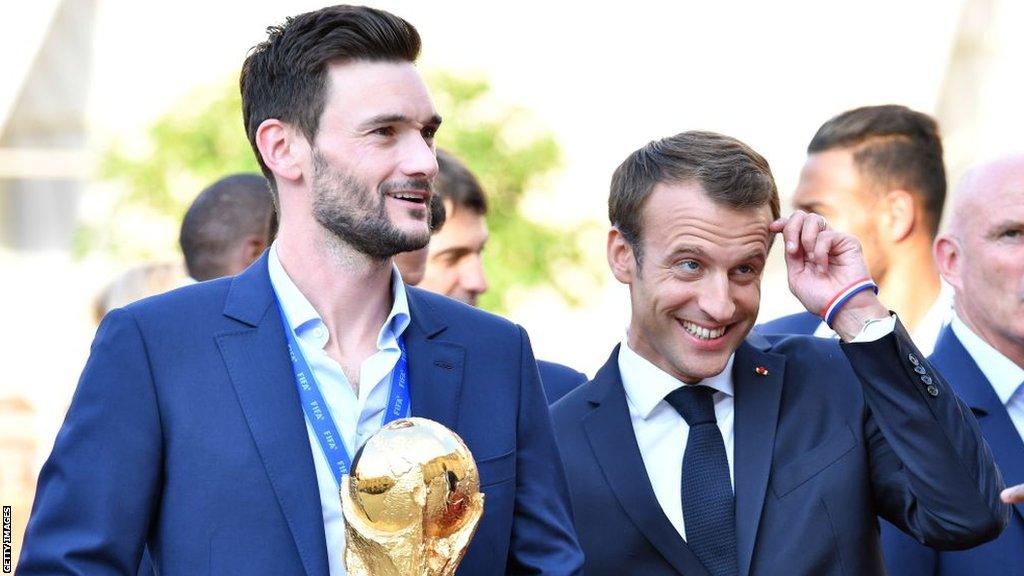World Cup 2022: French president Emmanuel Macron says sport must not be politicised
- Published

France captain Hugo Lloris (left) celebrates winning the 2018 World Cup with Emmanuel Macron
Fifa World Cup |
|---|
Host nation: Qatar Dates: 20 November-18 December Coverage: Live on BBC TV, BBC iPlayer, BBC Radio 5 Live, BBC Radio Wales, BBC Radio Cymru, BBC Sounds and the BBC Sport website and app. Day-by-day TV listings - Full coverage details |
The World Cup should not be a forum for raising political concerns, says French president Emmanuel Macron.
Fifa has asked nations to "focus on the football" during this year's tournament, which starts on Sunday, following a controversial build-up.
Gulf state Qatar has been criticised for its stance on same-sex relationships, its human rights record and treatment of migrant workers.
"These questions must be addressed when hosting is decided," said Macron.
Fifa's executive committee voted 14-8 for Qatar to host the tournament ahead of the United States 12 years ago, at the same time Russia was awarded the 2018 event.
Former Fifa president Sepp Blatter, who led the world governing body at the time, said Qatar's human rights record "was not discussed" during its World Cup bid.
There is concern about how LGBTQ+ people are treated in Qatar, where same-sex relationships and the promotion of same-sex relationships are criminalised, with punishments ranging from fines to the death sentence.
Amnesty International says that since 2010, hundreds of thousands of migrant workers have faced human rights abuses while employed to build wider infrastructure necessary to host the tournament.
"We must not politicise sport," said Macron, who will go to Qatar if defending champions France reach this year's semi-finals.
He added it was "a very bad idea to politicise sport", while noting that Paris will host the Olympic Games in 2024.
France's most successful club, Paris St-Germain, were bought by Qatar Sports Investments in 2011 and have won eight of the 11 Ligue 1 titles since.
In February 2021, the Guardian said 6,500 migrant workers from India, Pakistan, Nepal, Bangladesh and Sri Lanka had died in Qatar since it won its World Cup bid.
However, the Qatar government has said the total is misleading, because not all the deaths recorded were of people working on World Cup-related projects.
A recent report by Human Rights Watch said members of Qatar's LGBTQ+ community were detained and physically abused by the country's security services, while a Qatar World Cup ambassador was criticised for saying homosexuality was "damage in the mind".
Qatar's World Cup organisers state "everyone is welcome" to visit the country to watch the football, and that no-one will be discriminated against.
Peaceful protests have been planned by some players, while England's Harry Kane and eight other captains of European teams will be wearing 'One Love' armbands. to promote diversity and inclusion.
France were set to also take part, but captain Hugo Lloris has said he will not wear the armband because he wants to "show respect" to Qatar, where homosexuality is illegal and punishments range from fines to the death sentence.
"This will allow us to avoid having to answer questions on this before and during the competition because there comes a point where you have to keep the focus on the football rather than expend energy on things that are not our responsibility," said Tottenham goalkeeper Lloris.
"When we welcome foreign visitors to France we often would like them to respect our rules and our culture. I will do the same when I go to Qatar."
France begin their World Cup campaign against Australia on Tuesday and will also face Denmark and Tunisia in Group D.
Denmark will wear "toned-down" shirts to protest against Qatar, with kit provider Hummel saying it "does not wish to be visible" in a tournament it claims "has cost thousands of lives", while Australia's squad have released a video urging Qatar to abolish its laws on same-sex relationships.

Get the latest results and goal notifications for any team at the Fifa World Cup by downloading the BBC Sport app: Apple, external - Android, external - Amazon, external
